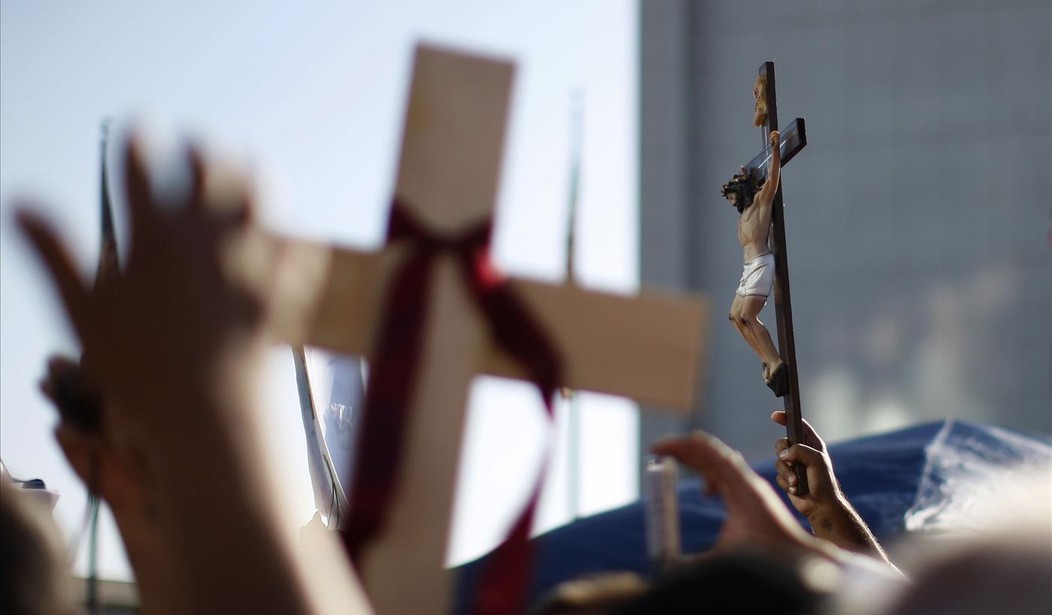Editor’s note: This column was co-authored by Kristin Carey.
Every Western Christian knows it: the feeling that comes when eyes turn away from us, when quiet scoffing and silent anger sweep over us. We know that feeling when we turn down vices, or bring up hopes, or steadily stick to “outdated” morals.
They (those who roll their eyes or keep their distance) hear we are Christians and assume we are some mix of naive, boring, closed-minded, prejudiced, and hypocritical. They ask us, again and again, not to judge them—we feel misunderstood. In this “us” vs. “them” mentality, Christians are pre-judged as judgmental.
In a graduation speech he gave this year at Liberty University, Jeb Bush said,
“How strange, in our own time, to hear Christianity spoken of as some sort of backward and oppressive force.... It’s a depressing fact that when some people think of Christianity and of Judeo-Christian values, they think of something static, narrow, and outdated. We can take this as unfair criticism, as it typically is, or we can take it as further challenge to show in our lives the most dynamic, inclusive, and joyful message that ever came into the world….”
It’s true that Christians are persecuted even here in America, and in harsher ways than the open criticism we’re used to receiving. We see the steadily tightening grip of government regulations closing in over the free expression of our faith and we see the public becoming increasingly more and more OK with it.
Western Christians, especially Americans, have grown to neglect our freedom. Our complacency is evidenced in our general acceptance of tightening regulations here at home, but it’s most apparent in our unconcern for the true plight of Christians who aren’t afforded the freedoms we take for granted. Around the world, 2014 was a record year for the persecution of Christians, though we didn’t hear much about it in the news. And 2015 is on track to be even worse.
Recommended
Open Doors is a non-profit organization that serves persecuted Christians in more than 60 countries. According to its website, 322 Christians are killed for their faith every month and 772 forms of violence (including rape, beatings, abductions, and forced marriages) are committed against Christians.
On the Open Doors’ list that ranks the 50 most oppressive countries toward Christians, North Korea is as at the top for the 13th consecutive year. There are 50,000 to 70,000 Christians imprisoned in labor camps in North Korea today, and anyone found engaging in unauthorized religious activity anywhere throughout the country may be arrested, tortured, or executed.
Though North Korea ranks at the top, the list is dominated by African and Middle Eastern nations. “Massacres are taking place for no reason and without any justification against Christians,” says Amin Gemayel, the former President of Lebanon. “It is only because they are Christians.”
Aleppo, the largest city in Syria, was attacked last month, forcing another wave of Christians to flee. The city, which used to be home to 400,000 Christians, now has only 80,000, and they are struggling to survive against the double problem of the war and the persecution they face for their faith.
You may have heard about the attack on Garissa University College in Kenya, where over 147 were murdered. Christian students were singled out and killed if they couldn’t quote the Quran. Many of the survivors had to lay for hours among the bloodied bodies of their dead friends, praying for their own lives.
The Hope: Being the Body
Hebrews 13:3 says to “Remember those in prison, as if you were there yourself. Remember also those being mistreated, as if you felt their pain in your own bodies.” It is our duty as Christians, and especially as free Christians, to remember and support our brothers and sisters who are suffering in ways we can’t imagine for the same faith we profess.
We are united into one body by that shared faith, and as members of one body, we share one another’s burdens—whether we realize it or not. 1 Corinthians 12:25-26 in the Message says, “The way God designed our bodies is a model for understanding our lives together as a church: every part dependent on every other part, the parts we mention and the parts we don’t, the parts we see and the parts we don’t. If one part hurts, every other part is involved in the hurt, and in the healing.”
We cannot remain unaffected by the suffering of Christians on the other side of the world, even if we choose to turn a blind eye to it. Persecution is like a cancer that will continue to spread, intending to destroy the entire body. We see it slowly creeping into the lives of Christians here at home already.But we can choose, as the stronger parts of the body, to assist our injured and struggling counterparts, and thereby strengthen the whole.
Barnabas Aid International is another one of many organizations on a mission to do exactly that. Its main ministry is to send financial aid to projects that aim to strengthen Christian individuals, churches and communities as they suffer persecution. The projects provide both material and spiritual support for needs identified by local Christian leaders. The whole idea behind it is that money is channeled “from Christians, through Christians, and to Christians.” It’s the church responding to its own needs, behaving as a body should.
These organizations are only as effective as the support they receive. We cannot allow ourselves to forget that we are individual parts of one body, and that we are each essential to its healing and growth. Our brothers and sisters depend upon our prayer and our sacrifice on their behalf.
If you would like to donate or learn more information about how you can support persecuted Christians, visit baranbasfund.org or open
























Join the conversation as a VIP Member